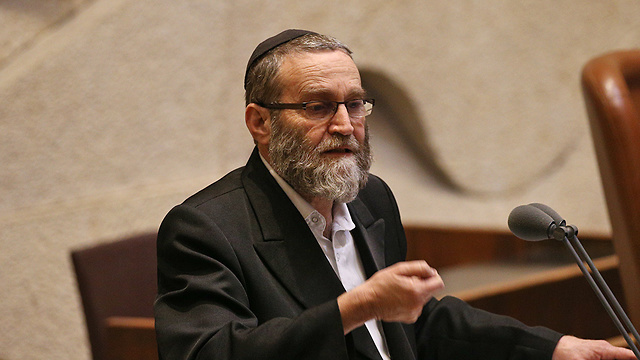
MK Gafni (L) and Minister Landver
Photo: Ohad Zwigenberg, Alex Kolomoisky
After all the drama and discussions, the coalition factions struck a deal that saved the political system from early elections, the United Torah Judaism (UTJ) party—which threatened to tear the coalition apart by refusing to approve the 2019 state budget until an amendment exempting Haredim from the draft law was passed in three readings—is conceding that it was right of them to eventually compromise.
"I'm sorry about the crisis and I think it was totally unnecessary," MK Moshe Gafni (UTJ) told Ynet, though adding that "if they had listened to us in the first place, this crisis would have been averted."
Asked whether the ultra-Orthodox MKs did not climb a tree too high, Gafni replied that it is possible, but they did so because the issue was that important to them.
"Everyone knows my position. I represent the flag of the Torah and we did not think we should go in more extreme directions than what is in this compromise," he said, adding while ultimatums are not the best path to take, lawmakers "have to remember that there is a coalition agreement" and they know it is partly the reason why an ultimatum was given.
Gafni said nothing was achieved from their struggle "beyond the fact that we are not going to elections and that the coalition is continuing," and that now "sanity returned to the coalition."
"The deal that has been achieved is a good one and we agree to it, even though there are many compromises within it," he added, agreeing that the Yisrael Beytenu party was right in insisting that such an amendment as the one they pushed for should not be passed without the involvement of the Defense Ministry and the army.
"I do not think anything will be dramatically different from what it used to be," he asserted, referring to the previous amendment they passed which was annulled by the High Court of Justice and sparked this crisis, concluding that he believes that, working together with other factions of the coalition, solutions will be found, and that he hopes "this crisis will not be repeated."
Meanwhile, the party that declared itself the biggest winner at the end of the crisis is the Yisrael Beytenu party, which received the compromise deal it requested, according to which the draft law amendment will be included in a comprehensive government bill that will be formulated by the Defense Ministry.
"We insisted on our principles and the principles of the soldiers in the State of Israel," Immigrant Absorption Minister Sofa Landver (Yisrael Beytenu) told Ynet, adding that while she is "certain that the bill that the defense minister intends to draft in this term will be good for everyone," in the end, "the decision (on the draft law) should be left to the defense establishment."
The deal managed to strike a delicate balance between the warring parties, ensuring that the conscription bill passed on Tuesday evening in its preliminary reading in the Knesset Plenum, but all factions were given carte blanche to vote as they please.
As a result, Landver was enabled to vote against the bill—as she had threatened to do—without being fired. The decision constituted a departure from a coalition agreement that ministers who vote against its decisions are automatically fired.


















